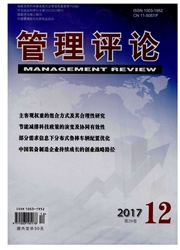

 中文摘要:
中文摘要:
我国“企业内部控制基本规范”及“配套指引”的发布,为实施我国上市公司内部控制综合评价奠定了基础。根据我国的内部控制监督评价体系目标,考虑我国上市公司特殊的制度背景以及注册会计师仅对上市公司财务报告内部控制进行审计等因素,有必要从满足外部利益相关者的决策信息需求出发,建立一种反映企业内部控制目标实现程度的内部控制综合评价模型.并由一个“局外人”(和企业没有利益关系的人,外部注册会计师不是局外人.他们和企业存在着相当大的利益关系)如政府监管机构或外部非营利性机构(如科研机构)对企业内部控制状况实施全面、综合、量化评价。基于此背景和客观要求,本研究根据内部控制理论、系统评价理论、“企业内部控制基本规范”及“配套指引”等建立评价指标体系.选择基于AHP的多层模糊综合评价模型,构建企业内部控制指数,并对内部控制指数进行分级,形成内部控制质量评价标准,由此建立起企业内部控制评价综合模型。利用该评价模型.本研究对沪市上市公司内部控制质量进行了检验。
 英文摘要:
英文摘要:
The release of basic norms of enterprise internal control and its supporting guidelines settle the foundation for comprehensive evaluation of internal control for Chinese listed companies. According to the target of internal control's supervision and evaluation system for Chinese enterprise, in consideration of special institutional background of Chinese listed companies and CPA's audit which only audits listed companies' internal control of financial reports and other factors, it is very necessary to establish a comprehensive evaluation model of internal control which reflect the degree of realization of the internal contro~ objective from the decision-making information needs to satisfy external stakeholders. And the comprehensive, integrated, quantitative evaluation for the status of enterprise's internal control is implemented by outsider (that is, the person who doesn't have interest relationship, internal CPA is not an outsider, there is considerable interest between them and enterprise) such as government regulators or external non-profit organization (such as research institutions). Based on this background and objective requirements, this study establishes an evaluation indicator system according to the internal control theory, system evaluation theory, the basic norms of internal control and supporting guidelines, etc., selects AHP-based multi-layer fuzzy comprehensive evaluation model, constructs internal control index, and sets up evaluation standard of internal control quality through classification of internal control index, thus establishes comprehensive evaluation model of internal control evaluation. Using the evaluation model, the study tests the quality of internal control for Shanghai-listed companies.
 同期刊论文项目
同期刊论文项目
 同项目期刊论文
同项目期刊论文
 期刊信息
期刊信息
